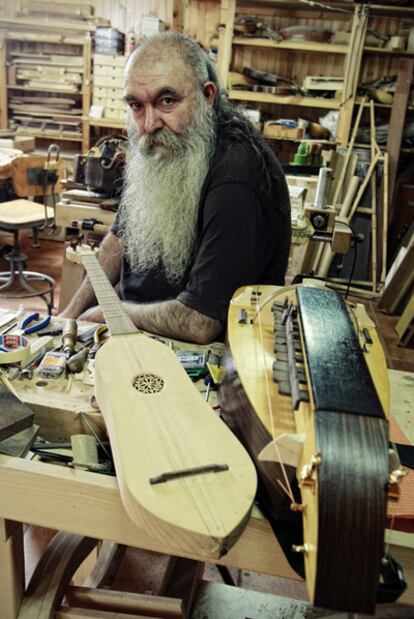The luthier who polishes his craft in the mountains of Madrid
Jesús Reolid fled the bustle of the city of Móstoles to concentrate on his art
Jesús Reolid spends his days in a wooden cabin, surrounded by instruments that replicate those of the saints and celestial choirs you see on the façades of monasteries. He is neither an eccentric, nor a hermit, but he did flee busy Móstoles eight years ago to be able to immerse himself in the laborious task of creating old-fashioned instruments from scratch. "Móstoles has become an uninhabitable city," he says from behind a bench in his workshop in Pelayos de la Presa (Madrid). "Here, it is more likely that I will annoy somebody rather than being annoyed myself."
Reolid, who has a long gray beard and an almost prophet-like appearance, started out as a craftsman in 1984, when a friend asked him for some instruments for his shop. "It wasn't even my own initiative," he explains. He has spent a lifetime toiling in the workshop: "I can spend all day working, or not work for a whole day."
Reolid is self-taught. At the beginning, the first thing he had to do was start an intense documentation process. "You start to make things, you try ways of working, you buy plans, you collect all the information that you can get your hands on and eventually you wind up making decent instruments," he explains.
One of the most interesting aspects of lute makers is their ability to recreate instruments of which there are no medieval examples left, just by observing a sculpture on the front of a Romanesque temple or studying a miniature in a codex. "You can see the number of strings, the way they hold it, how they play it... but you are always missing an awful lot of information, which you end up making up yourself," he says.
Accumulated in the cabin are instruments that smell of another time, but the prize item is the hurdy gurdy: a lovely and complex instrument that is still used in popular music in some regions of France. It consists of a box shaped like a walnut with a flat base on which the strings rest. These are rubbed by a wheel which has the same effect as a violin bow. The wheel is turned by a crank with which, depending on the speed, you can play rhythms. On the neck, keys act to cut off the strings like the frets on a guitar. Despite its number of pieces and its complicated assembly, Reolid considers it the instrument he has best mastered.
Prices for one of his hurdy gurdies start at 1,500 euros and go up depending on whether the customer wants him to add more strings or any other mechanical element. When Reolid plays one of his creations in the silence of the Pelayos mountains, the sound takes you to a hall at court or a tavern full of wine barrels and spent oil lamps.
Some of his works are in the Musical Instrument Museum in Urueña, Valladolid, where they form part of the permanent collection. "When you see the instrument behind a glass case, you think, 'I will die and these instruments will still be here'," he explains. "It's the same as when you see them on a stage, you feel nervous, it's exciting."
For Reolid, the secret of an instrument does not principally lie in the quality of the wood, but in how it is worked on. "The constructors' hands are very important," he explains. It is also crucial not to slack off on the way, as achieving an optimum result is a process of trial and error. "To make a very high-quality instrument, you have to make a lot of them. I've been offered assignments to make an instrument of which I have only made two or three and I didn't take them because I would do a mediocre job," he says.
What's more, he does not share the mysterious idea of Stradivarius of taking his instrument-making secrets to his grave. In fact, now he shares them in the meetings he has with other craftsmen during the year because he thinks that "enriches the profession. In the end, keeping what you have done a secret doesn't make much sense either."

Tu suscripción se está usando en otro dispositivo
¿Quieres añadir otro usuario a tu suscripción?
Si continúas leyendo en este dispositivo, no se podrá leer en el otro.
FlechaTu suscripción se está usando en otro dispositivo y solo puedes acceder a EL PAÍS desde un dispositivo a la vez.
Si quieres compartir tu cuenta, cambia tu suscripción a la modalidad Premium, así podrás añadir otro usuario. Cada uno accederá con su propia cuenta de email, lo que os permitirá personalizar vuestra experiencia en EL PAÍS.
¿Tienes una suscripción de empresa? Accede aquí para contratar más cuentas.
En el caso de no saber quién está usando tu cuenta, te recomendamos cambiar tu contraseña aquí.
Si decides continuar compartiendo tu cuenta, este mensaje se mostrará en tu dispositivo y en el de la otra persona que está usando tu cuenta de forma indefinida, afectando a tu experiencia de lectura. Puedes consultar aquí los términos y condiciones de la suscripción digital.








































